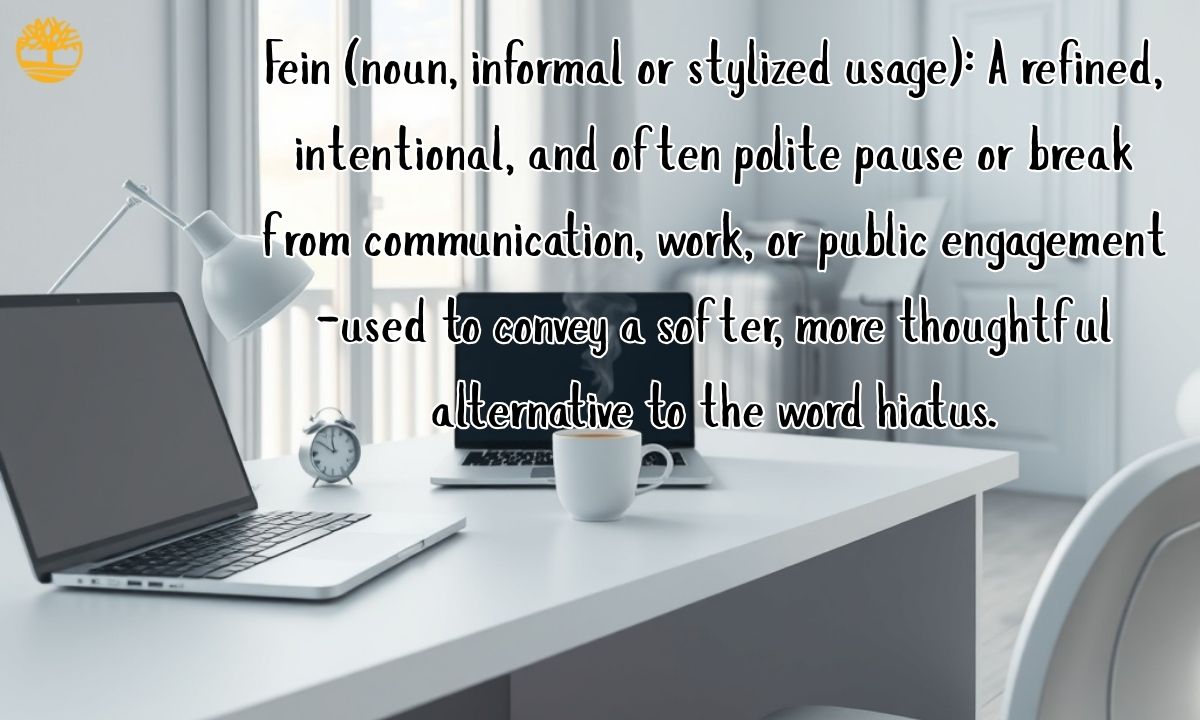One such term that sparks curiosity is “Fein.” It’s a small word, but its placement in modern communication feels anything but small. Whether in casual talks or professional settings, people reach for it to soften pauses or transitions. Understanding its role and alternatives can help you express yourself with more clarity and polish.
Language isn’t just about words—it’s about the subtle power they hold in conversations. Sometimes, a single term can shape tone, connection, and respect in ways we don’t even notice. When the wrong word slips out, it can sound too blunt, harsh, or even confusing. That’s why choosing the right alternative makes all the difference.
Understanding the Word “Fein”
The word “Fein” is versatile, shifting its meaning based on where it is used. From legal forms to casual texting or even cultural roots, it carries unique significance.
Legal and Business Context – FEIN (Federal Employer Identification Number)
In the business world, the term FEIN refers to a Federal Employer Identification Number, which acts like a company’s Social Security Number. It is required for tasks such as opening a business bank account or hiring employees. For example, a small startup applying to the IRS must have its FEIN before operations can officially begin.
This number is essential for maintaining tax records and ensuring businesses are recognized by the government. Without a FEIN, a company may struggle to file taxes or secure contracts with other organizations. For instance, an LLC requesting a loan will always be asked to provide its FEIN as proof of legitimacy.
Slang and Texting Context – Pretending or Faking
In casual conversation, “fein” often means to pretend or fake something, usually in a playful but critical way.
For example, someone might say, “Don’t fein like you care,” to call out another person’s insincerity. This makes it a common phrase in social media chats or text messages.
It can also describe moments when someone shows fake interest to avoid awkwardness. A friend might say, “She’s just feining excitement,” when the enthusiasm doesn’t feel genuine. This use of the word is short, sharp, and often carries a tone of sarcasm or light teasing.
Irish/Gaelic Origin – “Féin” Meaning “Self”
In Irish/Gaelic, the word “féin” carries the meaning of “self,” highlighting individuality and identity. It is often used in phrases such as “mé féin,” meaning myself, to emphasize personal expression. This makes it a word deeply rooted in heritage and cultural identity.
The usage of “féin” in Irish adds depth to everyday language, stressing authenticity and personal connection. For example, “tú féin” translates to yourself, reinforcing the focus on individuality. Unlike slang or business use, this version of “féin” reflects tradition and a sense of belonging.
Fein and the Hiatus Connection
The link between “Fein” and “hiatus” often creates curiosity in conversations. Depending on how it’s used, the phrase can sound either casual or more refined.
What Does “Fein a Hiatus” Mean?
When people say “fein a hiatus,” they are usually signaling a kind of pause or break. It can mean stepping away from something without making it sound too abrupt. For instance, a friend might fein a hiatus from social media to recharge.
The phrase is often used to make the idea of stopping feel less harsh. Instead of saying, “I’m quitting,” someone may say they’re feining a hiatus. This keeps the tone lighter and less final, softening the message.
Examples of Fein in Sentences
Writers and speakers use “fein” in creative ways to shape expression. A student might say, “I’ll just fein a hiatus from studying for a while,” to sound less stressed.
Similarly, someone at work could remark, “She’s feining a hiatus from meetings,” meaning she’s avoiding them politely.
In casual chats, it also appears with a touch of humor. A gamer could joke, “I’m feining a hiatus from losing today,” to lighten the mood. These examples show how “fein” adapts to both serious and playful tones.
Why Tone and Context Matter
The impact of “fein” depends heavily on tone. Used the wrong way, it might sound dismissive, but with the right voice, it feels respectful and even thoughtful. For example, “I’m feining a hiatus for clarity” sounds gentle, not harsh.
Context also changes meaning. In professional settings, the phrase comes across as polished, while in casual chats, it feels relaxed or even sarcastic. Knowing how to balance tone ensures “fein” communicates the message you truly intend.
Fein in Text and Digital Communication
In the world of digital communication, the word “fein” has found a strong presence. From social platforms to private chats, it carries its own style of expression.

Common Usage on TikTok, Snapchat, and Instagram
On apps like TikTok, Snapchat, and Instagram, “fein” often pops up in captions or comments. Users might say, “Don’t fein like you didn’t see this,” to call out playful denial. It’s catchy, short, and easy to drop into fast-paced conversations.
Its popularity comes from how quickly it conveys attitude. For example, someone might write, “She’s feining interest,” to point out sarcasm or fake attention. This makes the word relatable in the quick humor culture of social media.
How “Fein” Differs from “Fake”
While “fake” is blunt and sometimes harsh, “fein” softens the tone. Saying, “He’s feining confidence,” sounds lighter than calling someone a “fake.” This subtle difference is why people choose it in texting.
It also carries more playful energy compared to the negativity of “fake.” For instance, “Don’t fein surprise,” feels teasing rather than critical. This makes “fein” useful in keeping conversations less confrontational.
Should You Use Fein in Professional Settings?
In professional spaces, the word “fein” can sound too casual or slang-heavy. Using it in emails or reports might confuse colleagues who aren’t familiar with the term. For example, writing “I’m feining a break” could be misunderstood.
Instead, professionals usually prefer clearer phrases. A manager might say, “I’m taking a short pause” or “I’ll be stepping away briefly.” These alternatives keep communication polished and avoid misinterpretation.
Polite and Professional Alternatives to “Hiatus”
Sometimes saying “hiatus” feels too formal or heavy. That’s why alternatives can make pauses sound more natural, whether in casual chats or workplace updates.
Casual Alternatives (Taking a Breather, Pressing Pause, On a Brief Intermission)
In everyday speech, lighter words make breaks feel more approachable. Someone might say, “I’m taking a breather,” instead of announcing a hiatus. Another might joke, “Let’s press pause on this project,” to keep things relaxed.
Even “on a brief intermission” works well in casual tones. For example, a student could post, “On a brief intermission from exams,” sounding friendly without sounding dramatic. These phrases make pauses feel easygoing.
Professional Alternatives (On Hold for the Moment, On a Temporary Pause)
At work, people need polite clarity. Saying, “The project is on hold for the moment,” gives assurance without pressure. It shows the pause is temporary but purposeful.
Similarly, “We’re on a temporary pause” keeps the message clear and professional. For example, a company update might say, “The campaign is on a temporary pause due to revisions.” These phrases balance respect with professionalism.
Emotional Alternatives (Stepping Away for Clarity, Taking Space to Realign)
When emotions are involved, softer words matter most. Saying, “I’m stepping away for clarity,” sounds thoughtful and personal. It shows the pause is about growth rather than avoidance.
Another option is, “I’m taking space to realign,” which reflects care for mental or emotional balance.
For instance, someone might share, “I’m taking space to realign before making my next decision.” These choices communicate honesty with kindness.
When “Fein” Becomes Harmful in Communication

While “fein” can sound playful or soft, using it too often may harm trust. In serious situations, it can blur the line between honesty and pretense.
Risks of Pretending vs. Being Authentic
Relying on “fein” to cover feelings or actions may lead to misunderstandings. For example, saying “I’m feining fine” when you’re struggling hides the truth and prevents support. Authenticity builds connection, while pretending creates distance.
Over time, constant pretending can damage relationships and reduce credibility. A friend may feel hurt if they realize you were only feining interest in their concerns. Being authentic, even in small ways, is always more powerful than faking.
Fein vs. Authentic Break – A Quick Comparison
There’s a big difference between feining a break and taking a real pause. When you fein, you only give the appearance of rest, but an authentic break allows true reflection and renewal.
To make this clear:
- Fein a break = temporary cover-up, not addressing the real issue.
- Authentic break = honest pause, leading to growth and clarity.
Example: Saying, “I’m feining a hiatus” sounds playful, but “I’m taking time to recharge” shows sincerity.
Frequently Asked Questions
What Does Fein Mean in Text Slang?
In text slang, “fein” usually means pretending or faking something. For example, “Don’t fein like you care” is a playful way to call out insincerity.
Is Fein the Same as Saying Fake?
Not exactly. While “fake” feels blunt and harsh, “fein” has a softer tone. Saying, “He’s feining interest” sounds lighter than labeling someone as fake.
What Is the Formal Meaning of FEIN?
In a business context, FEIN stands for Federal Employer Identification Number. It’s like a Social Security Number but used to identify companies for tax purposes.
Should You Use Fein in Professional Writing?
No. In professional writing, “fein” may confuse readers or sound too casual. Instead, phrases like “taking a short pause” or “temporarily on hold” work better.
What Does Fein Mean in the Context of a Hiatus?
When paired with “hiatus,” “fein” suggests a pretend break rather than a real one. Saying, “I’m feining a hiatus” sounds playful, while “I’m taking a hiatus” shows sincerity.
Conclusion
Using “fein” can be lighthearted in casual settings, but it often masks true feelings. Real connections grow when people choose authentic words instead of covering up with pretense.
In both personal and professional life, being clear and genuine builds trust. Whether it’s taking a real hiatus or expressing emotions honestly, choosing authenticity always creates stronger communication.

Muhammad Shoaib is a seasoned content creator with 10 years of experience specializing in Meaning and Caption blogs. He is the driving force behind ExactWordMeaning.com, where he shares insightful, clear, and engaging explanations of words, phrases, and captions.











